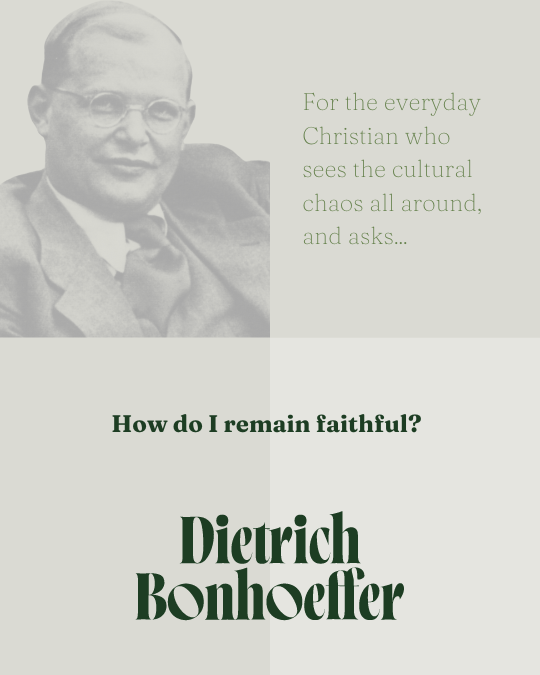
BibleMesh is pleased to announce Dr. Brant Himes as Research Fellow in Public Theology and Culture. This article is adapted from a conversation between Dr. Dennis Greeson, Dean of the BibleMesh Institute, and Dr. Brant Himes.
Tell Us a Bit about Yourself
I’m an associate professor at Los Angeles Pacific University, where I teach online courses in Bible, history and theology. I’ve been doing that for quite a while and really enjoy working with students in that context. I also serve at Westside Church in Bend, Oregon, where I oversee the young adults ministry. I really appreciate the opportunity to bridge the theology and the ministry aspects of what I do and bring those into both the academy and the church.
In my writing and research, I’m particularly drawn to German theologian and martyr Dietrich Bonhoeffer. When I was first starting my graduate studies, I took a Bonhoeffer course which really set me on the trajectory of studying him. Bonhoeffer’s approach to theology has been really compelling for me. It not only challenges me, but also it always draws me closer to Jesus and calls me onward in my own life of discipleship.
Even though I’ve studied it so much, it’s so hard to imagine Bonhoeffer’s context and what his suffering must have been like. In my relatively comfortable life, I’ve been challenged to see his faith carrying him through in such a compelling and profound way. I often wonder if I was ever faced with something, would my faith be strong enough to carry me through like his?
Why are You So Interested in Bonhoeffer’s Faith?
What has always stood out to me about Bonhoeffer is his faith. He takes very public and political stances, and yet his foundation is always in his reasoning and his ethics are always so centered in Jesus. I don’t think I can look at his political action apart from how his discipleship has developed.
For me, one of the questions in my research, writing and thinking has been, “What was it about his own understanding of his faith that equipped him to take the stands that he needed to take during that time?”
We don’t know what kind of situations we’re going to face in life, or what God has for us. But if we’re going to be equipped all that we may encounter, especially when Jesus tells us to expect to suffer for his name sake, then we need a faith and a discipleship that can really prepare us for what’s coming.
Bonhoeffer offers us an inspiring example through his life and his model of faith, but he also gives us biblical and theological resources through his writings to help lead us deeper into following Christ in our own times and places.
How Do You Recommend Getting to Know Bonhoeffer’s Writings?
All theologians and people need context, but with studying Bonhoeffer in particular, his historical context is really important. Some of the questions that he faces, the decisions that he makes may seem confusing or even contradictory for us. Bonhoeffer is a pastor and a theologian, he’s also an assassin and a spy. How do we put those things together? His life is a gripping story, and we can’t answer these questions unless we understand the context in which he lived.
For resources on this context, there are some good biographies of Bonhoeffer. Butthe one I recommend the most is the Eberhard Bethge’s book.
On Bonhoeffer’s writing itself, there is such a wide variety of writing to the things he wrote, and often they can seem inaccessible or too academic. I’d recommend Life Together as a great place to start. It’s a little book on community that is short and easy to read, and very pastoral. It offers a vision of how the church and its shared life in community is central to becoming a faithful disciple of Christ.
Additionally, he builds out what he means exactly by being such a faithful disciple of Christ and what it takes to follow Christ in The Cost of Discipleship.
These two are, I think, the most applicable to life and faith to everyday Christians and are a great entry-point into Bonhoeffer’s works.
Finally, the new course I’ve developed with BibleMesh takes you through a selection of Bonhoeffer’s writings over 8 lessons to highlight what he says about faith and following Christ. I think this would be a great next step for exploring what Bonhoeffer has to say to us today and how to make sense of his difficult context.

New Course
Bonhoeffer and the Life of Discipleship.
Dive into Bonhoeffer’s life and writings with our expert-led 8-unit course, and grow in your own life of discipleship.
What is Public Theology and What Does Bonhoeffer Offer Us in This Conversation?
When I think of public theology, I think of the common good and discipleship. The common good is one of the outcomes of discipleship. When we’re talking about personal spirituality and personal development, it can become a very kind of insulated thing. We need spiritual disciplines, and need to develop and cultivate our personal faith.
But if we only focus on these interior spiritual dynamics of discipleship, we neglect what Christ’s calling to become his disciple has to do with all the rest of life. Public theology, then, this reminder that our faith draws us into the public sphere, and it seeks to relate the faith to every part of life.
I like this idea of the common good because that’s a very broad term that could refer to politics, social issues, or even simple neighborliness. But its broadness can be a bridge to the good news that Christianity brings to culture. Christ brings life and flourishing and justice. The common good as an idea therefore anchors how we see God’s work in the world, and his gracious work in all areas of life.
Bonhoeffer is a natural conversation partner for public theology, in part because his story ends up being so political and it has a very public outcome. He’s arrested by the Nazi state. He languishes in a German military prison. He’s executed by the order of Hitler. And his brave actions that set him on that trajectory of suffering, to try to fight back against the injustice of the evil Nazi regime come from his discipleship, stemmed from deep convictions about Christianity’s importance for public life—for the common good of all people.
Another area in which I’ve researched and written is Dutch Neo-Calvinism and the thought of Abraham Kuyper. I like to compare Kuyper and Bonhoeffer because Kuyper is another example of someone who has much to offer Christian public theology. He was a Dutch theologian and prime minister in the Netherlands from 1901 to 1905. His theology and his discipleship leads him to the height of political power—very different than Bonhoeffer’s life and theology leading him to a prison cell. But Kuyper’s passion was to mobilize ordinary Dutch people to make Christ’s presence and kingdom rule felt throughout all society in order that Christ might bring life and flourishing to all as every square inch of culture is ordered to Christ’s ways.
Both Bonhoeffer and Kuyper’s examples help show that public theology is not always about the practical political outcome or being something only the elite of society are able to do. Its aim is to help ordinary people in engaging their faith and discipleship with the domains of ordinary life for the common good. Whether we’re called to be a prime minister or if our faith leads us into a prison, the goal is the same: to seek Christ and be his faithful disciple no matter the cost.
Brant Himes’ writings on faith, culture, and public theology will appear on the BibleMesh blog throughout the 2024-2025 term of the Research Fellowship.
